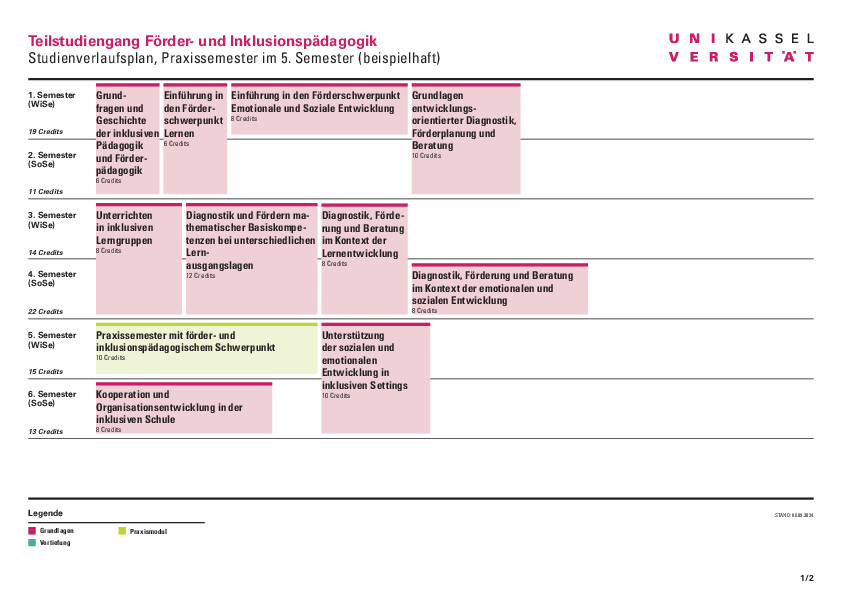Study structure
The content on this page was translated automatically.
Course content
Students
- acquire knowledge of the historical development of special and special needs education
- deal with the relationship between special needs education and inclusive education
become familiar with models of the organization of special education and inclusive education and reflect critically on these in relation to the goals and methods of inclusive school development
- reflect on fundamental ethical issues relating to heterogeneity, diversity and inclusion
- learn about didactic models for designing inclusive learning environments
- develop concepts and methods for monitoring, observing and documenting learning processes
- learn to analyze barriers to participation in classroom settings and reduce them through individual learning environments
After the basics, the in-depth moduleon support and inclusion pedagogy allows students to set an individual focus. This module offers the opportunity, for example, to gain insights into other areas of support, provided that these are covered by the course, or to take a closer look at counseling concepts, alternative forms of communication or the transition from school to work.
Students
- acquire the basics of educational diagnostics, observation and counseling
- learn about instruments for determining special educational needs and how to assess their significance
- learn to use instruments and methods to diagnose learning progression and individual interventions
- learn to create and evaluate individual support plans
- acquire the skills to draw up reports to determine special educational needs, taking into account legal principles
- acquire knowledge of the basics and areas of conflict in diagnostics and counseling
In the specialization area of learning, students acquire skills in the diagnosis, counselling and support of difficulties in learning at school. Learning difficulties are viewed as individual conditions that require symptom-specific measures and tailored intervention concepts to overcome them.
Students
- acquire knowledge about possible explanatory factors for the development of learning difficulties
- become familiar with didactic concepts for supporting the learning development of children and young people and apply evidence-based methods themselves or transfer the principles of these to inclusive teaching
- deal with relevant diagnostic methods and learn to use diagnostic findings to plan support and remedial measures
Integrated into the learning support focus, students acquire knowledge in the area of basic linguistic and mathematical education. This enables them to support pupils at both primary and secondary level with regard to the necessary mathematical and linguistic skills.
Basic mathematical education
Students
Acquire knowledge about the background to the acquisition of basic numerical skills and central aspects of learning arithmetic
- learn to assess the particular challenges of arithmetic learning processes
- acquire the competence to assess individual learning levels in mathematics and to develop tasks with diagnostic and support potential
Basic language education
Students
- acquire basic knowledge of the German language and writing system
- learn how monolingual and multilingual language acquisition and the development of writing and reading skills work
- develop the ability to recognize different levels of language development
- learn to assess the challenges of linguistic and literary learning processes
- acquire the skills to assess individual learning levels in German and to develop tasks with diagnostic and support potential
In the Emotional and Social Development specialization, students acquire skills in the diagnosis, counselling and support of impaired emotional and social development. Impairments in emotional and social development are seen as a symptom of complex problems that need to be addressed by involving various stakeholders (such as the children's families or other teachers).
Students
- acquire basic theoretical and empirical knowledge about the specific need for support in the area of emotional and social development
- learn to select and apply methods of special educational diagnostics in the area of emotional and social development in a well-founded manner
- learn to derive consequences for teaching, education and support in the area of emotional and social development as part of support planning on the basis of diagnostic findings
- learn to describe, interpret and apply didactic framework conditions and concepts, teaching and learning materials as well as teaching settings for teaching with a focus on emotional and social development
- learn the importance of causes of conflict within the classroom and the development of strategies to promote positive peer relationships and pedagogical relationships
- learn to describe and evaluate theoretically and empirically based concepts of prevention and intervention in the area of emotional and social development support
Students
- carry out guided teaching experiments and reflect on their experiences in accompanying courses
- plan and design naturally differentiating learning opportunities for heterogeneous learning groups
- deal with the challenges of learning and interaction, taking individual learning requirements into account
- learn to appropriately justify didactic and methodological decisions from a support and inclusion pedagogical perspective
